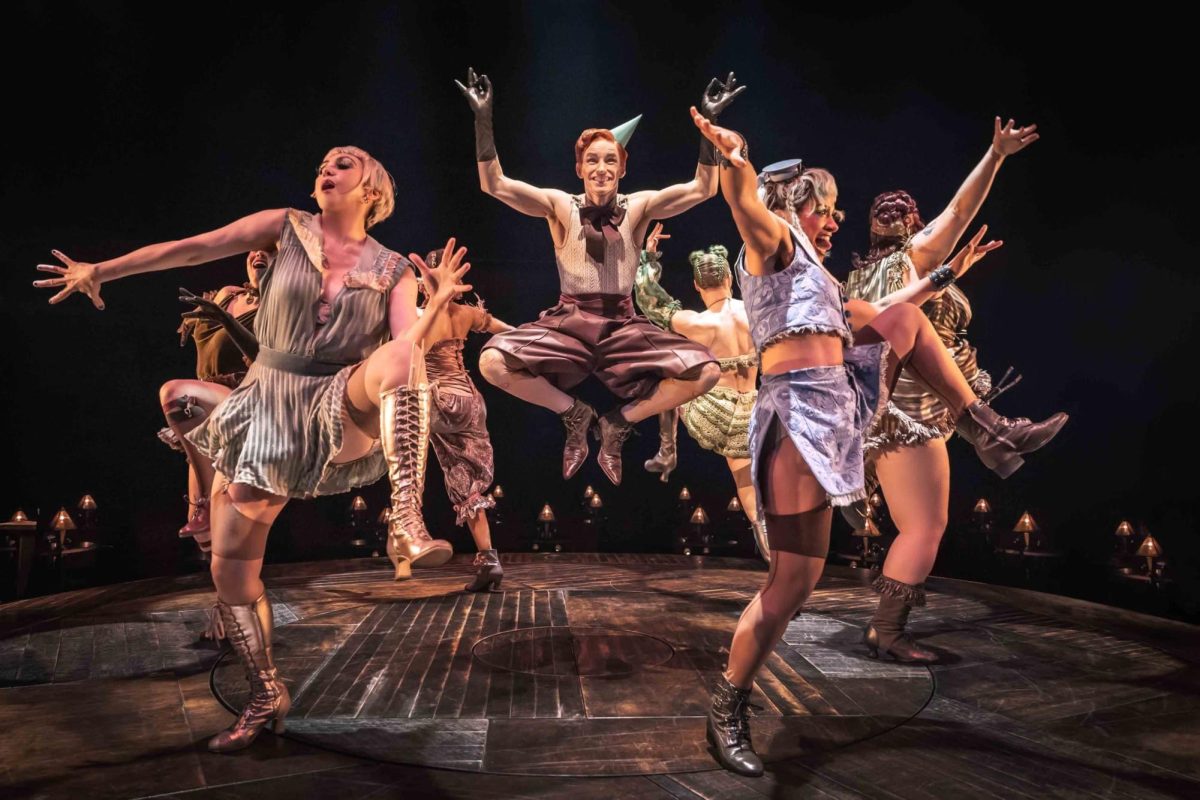When you step off the streets of Manhattan into the Kit Kat Club, you will immediately be transported to 1930s Berlin. Security and staff will encourage you to relax and loosen up, beginning by handing cherry schnapps to audience members over 21. Then, viewers are led through a hallway adorned with jarring portraits of actors before they enter a cavernous room dripping in gold decor, a space that is clearly meant to mimic the height of grandeur of the Weimar Republic.
With past emcees including Alan Cumming, Neil Patrick Harris and the revered performance of Joel Grey alongside Liza Minelli in 1972, the new revival of “Cabaret” on Broadway attracts the same amount of pressure as it does attention. The musical is based on “Goodbye to Berlin,” a novel by playwright Christopher Isherwood written in 1939 detailing his experiences in Germany. It was first turned into a play by John Van Druten called “I Am a Camera.” From there, the concept transformed into a musical produced by John Kander, Fred Ebb and Joe Masteroff. In all three depictions, writers set out to tell a different story about the horrors of the Holocaust. The Kit Kat Club is an allegory for the foreboding, tyrannical politics that loomed over a blossoming Berlin.
At the start of the show, viewers are met with a small circular stage. “Cabaret” is truly a masterclass in stagecraft — similar to the cherry schnapps and the abundance of decor, everything about this production is meant to lure viewers in. When watching the opening number “Willkommen,” which was re-popularized when it was performed at the 2024 Tony Awards, it is hard not to laugh at the emcee’s stilted, raunchy commentary.
The main plot line follows an employee of the Kit Kat Club, Sally Bowles, who has taken up a romance with an American writer visiting Berlin, Clifford Bradshaw. Sally gets fired from the cabaret club, and she and Cliff are living in somewhat of a la-la land, ignoring what is happening around them in Berlin. Eventually, when Sally finds out she is pregnant, Cliff urges her to come back to America with him so that they can raise the child together. Sally, still ignorant, asserts that the rapidly changing political climate won’t affect her or the baby’s upbringing, and decides to stay.
However, viewers are not supposed to be overtly aware that the Nazi Party is on the rise until the end of Act 1, when Ernst Ludwig, a main character, takes off his jacket to reveal a swastika. From there, the show deteriorates. In this new production, the show ends with the emcee being revealed as a Nazi himself, orchestrating the deaths of those that work at the Kit Kat Club. In other versions, the emcee is often portrayed as a victim of the Holocaust.
The show is meant to be seedy, weird and campy — viewers are expected to ignore subtle references to “Mein Kampf” and the ever-increasing tension throughout Germany. The dichotomy between the crassness of the production and the heartbreaking reality of Nazi Germany leaves the audience deeply unsettled. “Cabaret” is famous for this unsettling feeling — what does it say about an audience that we can so easily put aside our morals in the face of cocktails and catchy melodies? The show begs viewers to confront themselves.
When the final, extended beat at the end of the show sounds, the reveal is made, the lights go up and the air goes out of the theater. There is no more laughing, chatting or carrying on.
There is no question that this production touches upon issues relevant to modern American politics. In the initial aftermath of the show, this truth echoes loudly. Director Rebecca Frecknall’s revival presents that it has never been more important to protect the thing that we hold dearest — freedom to express ourself without the threat of violence. And, furthermore, “Cabaret” urges us not to ignore rising political threats. They do not always go away on their own.
“Cabaret” is a show about ignorance, beauty and performance. The narrative of life can get away from you once you become so enthralled by the beauty and art of the world. But that is the point — horrible things hardly ever look horrible before the second act. From the very first moment to the last, “Cabaret” dares you to enjoy yourself. The cast tells you as much from the very first note: “Leave your troubles outside … Here, life is beautiful.”
Contact Mikayla Smith at [email protected].
























































































































































